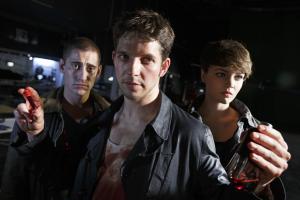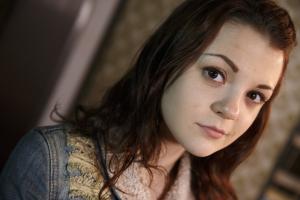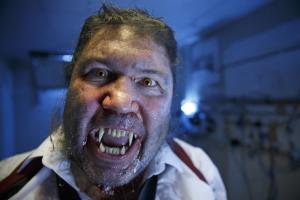Being Human: The Last Broadcast
Tuesday, 12 March 2013 - Reviewed by

The Last Broadcast
Written by Toby Whithouse
Directed by Daniel O'Hara
Broadcast on BBC Three, 10th March 2013
Yet just as Whithouse, his production team, and the cast defied this reviewer's expectations with a truly sensational return to form in the season premiere, a host of varied and mostly innovative episodes - and above all, a brilliant Trinity ensemble to replace the original trio of Annie, Mitchell, and George - with The Last Broadcast they have once again managed to beat the odds and create a virtually perfect climax to this five-year saga. It's difficult to imagine a more confident and successful end than this, and given the missteps that this BBC3 supernatural drama has made on occasion along the way, that's a staggering achievement.
Rather than entering into an investigation of the proverbial Satantic elephant in the room at the end of this review, it's better to deal with it right from the off. Yes, Whithouse cunningly riffed on none other than Christopher Nolan's Inception with the ambitious narrative of this instalment, playing with the perception of the characters and their situation on the part of the viewer in a manner that few could have anticipated. The final shot that pans to recap memorable iconography from the last five years, property of the original trio included, is beautifully handled, yet it's with the reprisal of the origami "wolf" motif from Tom's dreams that infers a darker fate for the Trinity than what's presented at surface level. Did Alex, Hal, and Tom really defeat Hatch, or did the century-old vampire give the game away to his greatest foe when he scoffed at the "mistake" that the Devil had made in his offers?
In many ways, it would be pointless to start such a debate again here, as I'm sure that fans already have their own take on the matter. It's this ambiguity, though, this uncertain epitaph to a constantly expectation-defying show that makes its denouement such a ground-breaking success for the drama genre. It would have been easy enough for Whithouse to settle with a definitive sense of closure as did Merlin, Robin Hood, and other recent BBC dramas to mixed results, so this decision is to my mind a far more bold and creative approach that other production teams should take heed of in the near future.
This wasn't the only strength of Broadcast though, quite the opposite. In fact, there were few overall limits to the quality of this masterpiece of a finale. Every member of the cast was once again on staggering form, with Kate Bracken, Damien Molony, and Michael Socha all shining as per usual at the helm, along with Phil Davis's crazed yet calculating Hatch and Stephen Robertson's resigned yet (seemingly) redeemed Mr Rook holding their own magnificently. The surprise of returning appearances from Ellie Kendrick as Allison and Gordon Kennedy as Alex's dad was certainly a welcome one too, solidifying the power of nostalgic odes to days gone by for this half-decade-spanning series.
The narrative structure itself was another masterstroke in Whithouse's strive to defy the expectations of the viewer here. Again, it would have been all too easy for Being Human's executive producer to simply spend 50 minutes with Alex and Tom attempting to redeem Hal before an inevitable confrontation with the Devil that placed the "good guys" on the top of the podium once more, and thus the writer's choice to spend over half the running time (or three-quarters, depending on the viewer's response to the final shot) in the dreams and past lives of the Trinity worked wonders. Perhaps this approach was meant as a testament to the quirky and off-the-wall nature of the show as a whole, or perhaps it was simply employed by Whithouse as a get-out clause from a straight action-packed finale - indeed, the strains on BBC Three's budget were plain to see in one of the most calm and insubstantial portrayals of the apocalypse yet. Either way, this manner of presenting the conclusion was just as daring as any of the show's other recent twists, and this reviewer hopes that the forthcoming new BBC Three fantasy drama In The Flesh attempts to shock and defy expectations to a similar degree.
Of course, in mentioning the channel's next attempt to tackle fantasy drama, set to broadcast its first episode next Sunday in the same timeslot, I've reached the inevitable loss that BBC Three has forced upon itself by cancelling Being Human. In spite of some of the growing pains and transitional difficulties that have faced it during its five years on air, Whithouse's most ambitious series has become a true cult hit with its growing fan base, and its absence from the TV schedules come 2014 will be one I reckon will hit the channel harder than it can possibly imagine. Recent cult successes such as The Fades and Doctor Who Confidential suffered much the same fate at the hands of BBC Three controller Zai Bennett and the channel's other execs, with immediate fan backlash in both departments likely causing more harm to BBC Three's reputation than was thought probable, a turn of events that is likely to repeat itself in this instance and certainly won't leave the head honchos with much of a leg to stand on at this point.
Let's not conclude on a bitter note, though. By informing Whithouse of its decision to axe Being Human before he began writing the fifth season, the BBC at least gave this talented sci-fi and fantasy writer the chance to pen the perfect conclusion to his half-decade pet project. Through the years we've followed Mitchell, George, Annie, Hal, Tom, and Alex on their adventures, a journey that this reviewer can safely say has been an especially worthwhile and rewarding one for those viewers who got hooked in its early stages. There will always be a sense of bitter-sweet melancholy surrounding the trail of thought on what Being Human could have become in one such “"alternative" world (as Hatch named those dream spaces) where The Last Broadcast wasn't the end. However, to spend our time lamenting BBC Drama's latest gross financial mistake would be to do a disservice to those dedicated actors, writers, and producers who have spent five years making the world of Sunday-night entertainment a better place, more than predictable period dramas such as Call The Midwife and Mr Selfridge ever could.
Few dramas these days manage to curtail their final season with such vigour, such aplomb, and such enthusiasm surrounding their central cast and arc narratives - in that respect, we as fans can remain ever grateful to Whithouse and the production team for providing a fittingly ambiguous denouement to leave that much-needed impactful legacy for The Greater Good. To paraphrase a certain Girl Who Waited, this was the spell-binding story of Being Human, and The Last Broadcast was how it ended.









